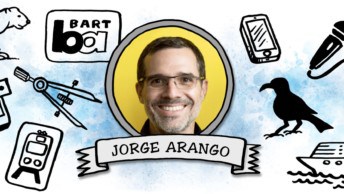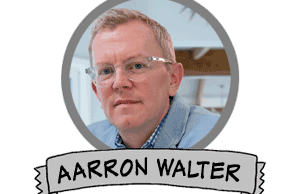Our latest chat session got off to a rocky start when for the first time in Ask the UXperts history, I almost got the time wrong by an hour. Luckily past-Hawk wasn’t quite so useless (and future-Hawk has learned a valuable lesson), so the reminder email and tweets that I hooked up last week did the job… and reminded me. Once I got over being flustered, I thoroughly enjoyed the session, which turned out to be a specially valuable one.
The subject of the chat was empathy and active listening, and our UXpert was the amazing Indi Young. Indi literally wrote the book on the subject, launching Practical Empathy, earlier this year. An independent consultant, Indi helps teams with person-focused research, product strategy, and experience flow.
If you didn’t make the session because you didn’t know about it, make sure you join our community to get updates of upcoming sessions. If you’re interested in seeing what we discussed, or you want to revisit your own questions, here is a full transcript of the chat.
| HAWK | First up, I’d like to introduce you all to Indi Young, our UXpert for the session |
Thanks so much for making time to chat with us today Indi | |
| indi | Glad to do it! |
| HAWK | To give you the formal bio: |
Indi has been a trailblazer of experience design since the dot-com boom, using her roots in computer science to help people adopt a neutral, well-considered mindset. In 2001 she was a founder of Adaptive Path, the San Francisco experience design agency. In 2008, her book Mental Models, introducing mental model diagrams, was published. Her second book, Practical Empathy, was released in 2015. She writes articles, conducts workshops and webinars, and speaks about the importance of pushing the boundaries of your perspective. | |
If you haven’t already, I’d recommend checking out Indi’s site http://indiyoung.com/ | |
| indi | (I just put up the workshop descriptions, finally!) |
| HAWK | I’m really interested to hear more about todays subject, because I think empathy is something that we could all do better! |
on that note, I’m going to hand over to Indi to give us an introduction to the topic | |
| indi | That’s what everyone says. “empathy” — I want me some more. |
but what does “empathy” mean? in relation to your work? | |
There are all sorts of definitions. Most common is “be more sensitive.” | |
which is nice, but not viable in a *lot* of organizations. | |
There’s emotional empathy (also called “affective empathy” in academic literature) | |
which is basically a strong emotional connection with another person over something they said, where you feel their emotion | |
it’s illuminating and powerful; you’ve all probably felt emotional empathy at some point. | |
but in research, you can’t force it. In collaboration with others, you can’t force it. | |
so … for reliable, repeatable empathy in your work (creating things, collaborating with people) you need to learn to develop cognitive empathy | |
cog empathy gets a bad rap from Daniel Goleman–he says it leads to manipulation | |
but that’s only one of many things you can use cog empathy for. I use it “to support” others. (help them achieve their purpose or intent) | |
cog empathy is defined as learning the underlying reasoning, decision-making, guiding principles, and reactions that another person has. | |
and if you do that over a lot of people, you start to see patterns. people start to fall into behavioral groups that are NOT AT ALL demographically defined | |
(I see way too many professionals fall into the trap of assuming a demographic implies a behavior. Correlation is not causation. Remember that lesson from university?) :) | |
| HAWK | Heh, indeed. Do you agree with Daniel Goleman re manipulation? |
| indi | Daniel Goleman is right that cog empathy when used by someone to *change another person’s behavior* is manipulative. |
and true, people do this. Political folks. even ux folks. the latter use falls under the category of “dark patterns” | |
You can google “dark patterns” to see what I mean. It’s trying to get a person to do something she might not do ordinarily. like buy that expensive purse or sign up for an extra mobile plan | |
| HAWK | Do you have any tips around avoiding that? |
| indi | quit your job if your boss asks you to do this? Hah! no. you won’t quit your job. But eventually you will |
just be aware of how you are using your knowledge about how other people are reasoning. | |
there’s another thing that is VERY important with regard to practical empathy. | |
It’s something that you explore up at the “purpose & intent” level, not down at the “usage goal” or “tasks/requirements/needs” level. | |
You don’t want to develop cognitive empathy through the lense of your offering. It isn’t really emapthy–not super deep at that frame. | |
| katie | Hi Indi – where in the empathy model do you look to first when intending to support someone? Which aspect of empathy (reaction, thinking or beliefs)? |
| indi | Hi katie! I look at all three of those: reasoning, reactions, and beliefs. |
| katie | Ah ok! |
| indi | I usually take it to the extent of letting the patterns build themselves into hierarchies that then form the top half of a mental model diagram |
those towers in the top half of the mmd depict all three: thinking, emotions, and guiding principles. | |
(Note that I use lots of different vocabulary to refer to the same three concepts–on the off chance that one set of words will resonate with each of you.) | |
the nice part about these patterns of thinking/reaction/belief is that since they are framed at the purpose/intent level … | |
they don’t ever become untrue. Evaluative research becomes untrue (you throw it out) when you’ve made the changes to your serivce or policy or process or content that is indicated. | |
Solution-framed research becomes untrue the minute you change your solution. ipso facto. | |
but purpose-framed research (developing cog empathy and letting the patters build) is cumulative and is true for decades and decades | |
Example: | |
tasks/requirements/needs level: i need to track my exercise and my calories for today | |
usage goals: change my eating or exercise based on the trends that I see over time for myself | |
purpose/intent: stop leading an unhealthy-feeling life that makes me just want to drop on the sofa and watch tv all weekend | |
purpose/intent: spend more time with my grandkids, who take up a LOT of energy, so I need energy | |
purpose/intent: become more attractive to my wife again | |
purpose/intent: fit into that special new year’s eve dress! | |
You see, there are tons of purpose/intents, different ones for different people | |
you can explore what makes sense to your org over the years. | |
Anyone read the book Practical Empathy yet? | |
| katie | Thanks Indi – that helps! |
I read it | |
| Angelia | Hi. No not yet, I will have to look it up |
| HAWK | indi: What do you find to be the biggest roadblock in getting stakeholders to change to a more empathetic way of working/thinking? |
How do you communicate the importance? | |
| indi | anyone who’s read the book have questions? |
Just saw Hawk’s question. | |
stakeholders … yeah … | |
Stakeholders (I”m grouping them together here, which is not quite correct, because they are different) | |
they have pressures. budgets. line item responsibility. launches. hiring/firing. | |
Those pressures (and the industrial age mindset of “bottom line” and “quality management”) make for sub-optimal decisions, to borrow a term from Hawk | |
So when i go into a client, often I will start with a set of listening sessions with each of the stakeholders | |
the scope of the research is “what is of concern to you?” I get current and history for each stakeholder. | |
I dig deep into their reasoning, their reactions, their guiding principles. I get past opinion and preference, statement of fact and explanation. I develop cog. empathy | |
then I look for patterns and present back the patterns I find among all the thinking. it’s a great way to get stakeholders thinking from a new frame of mind | |
| HAWK | Can you expand on “listening session”? |
listening session: it is also called “active listening” and there are many books and TED talks about it. Check out Julian Treasure. | |
| HAWK | Will do. |
| indi | But what you do in a listening session is very different than what you do in an interview. |
different than a conversation, too. You subtract your SELF and your ORGANIZATION from what you explore | |
this means no list of questions at the start. only ask the scope question. (e.g. what’s on your mind about the state of your energy/health these days?) The other difference is no notetaking. None. Forbidden. You have to be completely present for the other person, to be able to go deep and develop empathy. Record the listening session and get a transcript. | |
| HAWK | To the group: are any of you using the techniques that Indi is talking about already? |
| Katie | Indi – would love to learn how purpose differs from different kinds of goals (personal, productivity, organizational, life) – especially as we might use the empathy model in personas to replace goals. It’d be great if you could speak to that! |
| indi | when I say goals, I mean the “usage of our product/service/process goals.” So the goals you list might be purposes. For example, “I feel so bad that at the end of every work week, it seems like I haven’t gotten any further. Why?” That would explore one facet of productivity. Right? |
| Danielle | I recently completed a set of listening sessions and whenever I prompted a question, I kept referring to closed questions. Any advice (other than practice) to cut out that bad habit? |
| Danielle | 2nd Question: I do these in house in government, I found it hard to get some people to start talking as I think they were worried they’d get “dobbed in”. Any way I can help them get past this hesitation? |
| indi | Danielle: what do you mean by “prompted a question?” |
I think you might mean “dug deeper?” | |
| Danielle | Yes |
| indi | Cool. Yeah, when you dig deeper, latch on to what the person just said … to see if you understood it or if you are making assumptions or guesses about it. Say a person tells you, “I hate swimming in the Bay.” |
You might assume it’s because it’s got sharks in it, or because it’s grimy. | |
rather than referring to your assumptions, you can say, “because …?” | |
Usually the digging questions are just one or two words, not even forming a complete sentence. it’s just to keep the other person talking | |
| katie | Thank you, Indi – re: goals – that clears it up |
| indi | Danielle … govt! yeah, don’t want people to close up too much, but suspicion and worry and doubt abound! Usually that happens because a session is framed by the thing being explored. |
If you take it out of that realm, so no worry or blame is possible, people will chat. but it has to be personal. and it has to be non-opinion or preference based. | |
can you give me an example? | |
In the meantime: Lynne. devloping these skills … takes practice. | |
practice means dropping into this curious mindset whenever you can, especially with strangers. | |
like in line at the grocery checkout, at the gym, wiating for the train, etc. | |
| Danielle | It was, yes. Because it was a legislative topic (employment), I tried setting the context at the beginning and mentioned that I would be taking the stories back, not the names of people and companies, to help us understand the employment context better and that they wouldn’t get in trouble. I don’t think it alleviated everyone’s worries though as they often repeated that back to me in the session. |
| indi | where it’s okay to talk to strangers. bring up something, an d see if you can keep the conversaion about them and get down deep to their thinking, rather than preferences |
just this morning I was in the locker room, which is where the “i hate swimming in the Bay” example came from. | |
I kept curious, didn’t let the assumption happen, and she continued, “I’m not afraid. it’s not that there are sharks. it’s the salt water.” pause. “the salt water … | |
… does awful things to my hair and my skin.” | |
ah ha! | |
The other half of the skills question is that narcissists won’t ever learn how to do this, except from a manipulative (dark pattern) point of view. | |
I spoke to a group of young lawyers, and they were like, “It’s all narcissists at the firm!” Groan | |
Well, that’s what you get for choosing the law as your career? Heh. Poor guys … I felt bad for them. | |
Danielle, thanks for the example. You mean employment of people by the govt? (Or unemployment benefits and admin thereof?) | |
I can see if it was the former that people would clam up. | |
What would need to happen is do listening sessions with a different group of people than those whose jobs were at risk, I’d say. Similar jobs. Then ask about what brought them there, what they are planning for their career. | |
| lynne | How difficult is it to develop these skills – does it take a lot of practice or coaching? I’m just not the sort of person who strikes up conversations with strangers (too introverted I guess), so this sounds rather scary…. |
| indi | Lynne: I am an introvert. Very shy. But, in the interest of doing a good job of design, I taught myself to do this. |
most people in ux are passionate about *making things better!!!* | |
true? The reason you are intersted in ux? If so, use that *passion* to make yourself reach out to a new skill | |
| Danielle | indi: Understanding private employment between two parties. The govt mandates minimum standards and rights that have to be held and we were investigating their knowledge and beliefs about them, in a vulnerable population. |
| indi | Danielle: ah! good. clearer. (I did a similar study with busiensses in US required to hire people with disabilities by a certain number.) |
So you were talking to the employer, I think? | |
and the employer didn’t want to get “caught” doing the wrong thing? | |
If true, then … | |
| Danielle | Lynne: For introverts it is hard to start the conversation but some introverts I’ve met are the best active listeners. I don’t have issue starting the conversation but I often need to remind myself to be quiet and listen, and that pauses in the conversation were ok. |
| indi | might help to represent yourself as an independent doing research. Maybe for a uni. or as a student. Innocuous. |
The study I did was actually conducted through Cornell University. Couldn’t ask those q’s as the govt agency itself. | |
would that help you, Danielle? | |
| Danielle | indi: It was both, employees were often concerned that speaking badly may affect their visa status, their boss might fire them and this job (even if it’s breaking the rules) was better than no job etc.. |
| indi | For both employers and employees, helpful to route your study through a neutral party. Universities are perfect. |
Also some NGO’s and such, but probably harder to form a collaboration with.Or maybe not. I haven’t tried. | |
| maadonna | Danielle: that situation sounds impossible to get good information! |
| HAWK | indi: I’m interested in your earlier point about not taking notes. Can you explain a bit more about that? We have the practice of note-taking fairly heavily ingrained… |
| indi | Notes! Heh. (evil laughter) yeah. people are using notes to “process” what they hear and make sense of it, no? |
Well, during a listening session you are NOT SUPPOSED TO BE MAKING SENSE OF THINGS. caps intended. heh! (evil laughing again! :) :) :) | |
Danielle has it right. active listening is all about concentrating on the other person. it’s easy to fall back on the crutch of note taking when the topic gets complex or confusing | |
| HAWK | That makes sense. I also rely on notes to remember things though. Is this more about ‘getting a sense’ of things than a deep understanding? |
| indi | Too easy. Must train your brain to keep digging. Keep reminding yourself that you don’t *really* know what the person is saying. Keep asking for the reasoning that happened during a specific event, to really start to understand and develop cog empathy |
| HAWK | I guess what I’m saying, is that I’m a very analytical thinker, and the idea of not taking notes leaves me feeling worried that I might forget important things, or who said what |
| Danielle | indi: I did semi resort to that even if it felt a bit untruthful – I was doing it with a design company (to help with coverage) and I started to mention them in the context setting a bit more. Thanks for answering. @donna: it was tricky but we did get some good conversations in the end :) |
| indi | Danielle: glad good conversations came in the end when context was set. Is tricky. You are recording the listening session. YOu will not forget anything, nor who said what. |
| HAWK | Good point |
| indi | Active listening = no analytical thinking. Practice, practice, prractice. jsut follow topics |
if a topic comes up pthat you’re afrraid you’ll forget the | |
then jot a one or two-word note to yourself, so you can get back to it later | |
but usually if you’re digging, that same topic will come around again all by itself. | |
| HAWK | Sure, makes sense. Thanks. |
| indi | when a participant realizes how deep you want to go, they open up. they enjoy trying to explain the deeper thinking. they try to round up all their thoughts for you |
| Dee B. | regarding note taking: i’m preparing for some interviews — i mean, listening sessions and have invited another person to take notes and be a fly-on-the-wall. i’ll also record the sessions for later viewing. |
| indi | You can have someone esle taking notes, but it’s useless |
it’d be better if that second person was trying to develop cog empathy at the same time as you! | |
with a recording, you do not need notes | |
there are times when a recording would be awkward … | |
in those cases, do not take notes! Listen actively. concentrate on going deeper. do not analyze | |
and then after the session run back to your notebook and write as many things that person said … | |
… TRANSCRIPT STYLE, that you can remember | |
my experiements with this show that I remember about 33% of what was said. | |
this is ENOUGH for most cases. :) | |
it’s time for us to be less “perfectionist” and “process-oriented” and “analytical” … jsut for the listening session. | |
balance those analytical brain muscles with “follwoing/digging” brain muscles. those latter are atrophied in a lot of researchers. | |
and so they don’t go deep enough. they don’t develop cog. empathy. | |
| HAWK | Heh. I’ll need to do a fair bit of work on those brain muscles, but I’m hearing you! |
| Matt C. | indi: If people are concerned to be identified. How do you gain permission to record the session? |
| indi | Matt C: no identification required. Just use numbers and make their name completely private. Don’t even write their name in the transcript or any reports or docs. I have not had a problem with recording when I recruit saying that their name won’t pass that stage. |
| Jong-won | How many people do i need to meet to get cog empathy? How long do i need to talk to the person or people |
| indi | Jong-won L: One person = cog empathy. you only develop cognitive empathy with one person at a time. But … |
if you want to see patterns across people, then five or six people of the same BEHAVIORAL audience segment. | |
(not demographic audience segment) | |
| Jong-won L. | Thank you |
| indi | Jong-won L: the listening session lasts as long as the pariticipant has stuff to tell you about his inner thinking. Often that’s 60 minutes, but just as often it’s shorter or longer |
:) Sorry to pick on you Hawk. :) :) You can do this. It will be illuminating. | |
| HAWK | Haha, don’t be sorry! |
| indi | oh my, in looking at the transcript, I have lots of upper case. I guess that shows the energy and passion I have for what I am saying. I hope. |
| HAWK | So, we’ve hit the hour mark. You’ve been an absolute star Indi. |
| Jong-won L. | ;-) |
| Matt C. | indi: Thanks |
| indi | Thanks for everyone’s questions! |
| HAWK | Did you want to link us to your workshop, or anything else that might be useful? |
| Danielle | Yes, thanks Indi! |
| Dee B. | thanks so much, indi, very insightful! |
| Lynne | Thanks, you’ve inspired me to try leaving my comfort zone! |
| indi | And best of luck to the UX career changers. welcome to the tribe of “making things better!” |
| Jong-won L. | Thank you all for this session |
| indi | Workshops: http://indiyoung.com/workshops/ |
| HAWK | I’m feeling inspired also. Thanks Indi. |
| indi | Consulting: http://indiyoung.com/consulting/ |
Also, there are tons of resources on my site to peruse: http://indiyoung.com/resources/ | |
| HAWK | I’ll post up this transcript tomorrow on UXM for anyone that wants to see what they missed |
| indi | including past talks and such. |
| HAWK | Brilliant, thanks! |
| indi | And, best of all, lots of my clients are remote clients. So it does not matter where in the world you do your work! :) |
| HAWK | Have a great rest of the day everyone. Thanks for taking part in the session today. |






This transcript very useful to know about good UX practice… Thanks for sharing this Useful info.